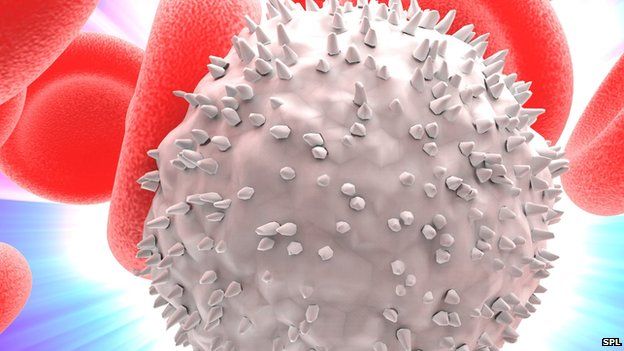Cancer blood test moves closer after promising results
- Published

A British team of researchers has developed what might be a simple blood test that can detect all cancers.
Scientists from the University of Bradford have so far used their technique on three types of cancer with promising results.
It is hoped that in time the test could prevent costly and invasive procedures such as colonoscopies and biopsies.
But researchers say it is still very early days and much more work is needed.
Blood tests have been used before to detect different types of cancer, but the Bradford team hopes to develop a universal test for all cancers.
The technique involves subjecting white blood cells to ultraviolet light which damages the cells' DNA.
So far tests on the blood of melanoma, colon and lung cancer patients have shown the DNA is more easily damaged compared with healthy volunteers.
Those patients with pre-cancerous conditions showed an intermediate level of damage.
The researchers believe the results would not be affected by illnesses such as colds or flu that may affect the immune system.
Their work is published in the FASEB Journal.
'Stressed'
Prof Diana Anderson, from the University of Bradford's School of Life Sciences, who led the research said: "White blood cells are part of the body's natural defence system.
"We know that they are under stress when they are fighting cancer or other diseases, so I wondered whether anything measureable could be seen if we put them under further stress with UVA light.
"We found that people with cancer have DNA which is more easily damaged by ultraviolet light than other people, so the test shows the sensitivity to damage of all the DNA - the genome - in a cell.
"These are early results completed on three different types of cancer and we accept that more research needs to be done; but these results so far are remarkable."
That view is backed by Cancer Research UK, which emphasised the research was at a very early stage.
Dr Anthea Martin, Cancer Research UK's science information manager, said: "Diagnosing cancer earlier is key to improving the chances of survival, but any new technique must be thoroughly trialled to make sure it is reliable and accurate.
"Although this small study is interesting, there are still a lot of unanswered questions about this test and much bigger studies are needed to prove whether it could be useful for diagnosing cancer on a wider scale."
However, Professor Shirley Hodgson, a professor of cancer genetics, at St George's, University of London, was more sceptical about the University of Bradford study.
"Overall, this is a small study with very significant limitations," she said. "We cannot derive from this study an indication that the comet assay test [the technique used in the Bradford study] can detect cancer, and certainly not all cancers.
"A much bigger experiment, including better-controlled groups of patients, is needed before we can determine how useful the test could be in cancer diagnosis."
- Published29 November 2013
- Published4 November 2013
- Published17 August 2011